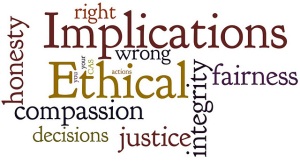With attorneys and their hired consultants routinely collecting social media evidence for investigation and eDiscovery purposes, it is important to be aware that such activity can generate various direct and indirect communications to the subject account owners. Sending a Facebook “friend” or a LinkedIn “connect” request are obvious examples, but there are also less overt means of social media communications. For instance, if a hypothetical law firm named Smith & Wesson were to merely follow a witness on Twitter, the service will automatically email the witness with a notification that Smith & Wesson is now following her. Additionally, it is all too easy when viewing a Facebook page to inadvertently “like” an item or accidentally send a friend request through a single mouse click. And if you simply view another’s Linkedin profile while logged into your own account, that person will often be notified that you viewed his or her profile page. 
For lawyers and their hired consultants and investigators, all this can be very problematic considering legal ethics rules that strictly regulate communications with represented parties and even jurors connected to a case. Several local and state bar associations have issued legal ethics opinions discussing this issue specific to collecting social media evidence. On December 6, X1 Discovery hosted a live webinar to delve deeper into this topic with the esteemed Ralph Losey of Jackson Lewis as the featured speaker. Ralph is the lead eDiscovery partner at Jackson Lewis and the author of “The eDiscovery Team,” considered by many to be the best legal eDiscovery blog on the planet. You can register for the recorded version of this webinar at this link here. (One hour of ethics CLE credit will be available to California attorneys).
From our perspective, this critical concern involving indirect social media communications and legal ethics underscores the importance of employing best practices technology to search and collect social media evidence for investigative and eDiscovery purposes. Collecting evidence in a manner that prevents, or at minimum, does not require that attorneys and their proxies directly or indirectly communicate with the subjects from whom they are collecting social media evidence is a core requirement for solutions that truly address investigative and eDiscovery requirements for social media. If user credentials to the social media account have been properly obtained, that is obviously ideal. However, in many instances lawyers must resort to searching and collecting publicly available information. In such situations, it is crucial that the law firm and/or its hired experts conduct such collections in the proper manner.
For instance, X1 Social Discovery software features public Facebook capture that can search and collect publicly available Facebook pages without directly or indirectly notifying the account holder. This is critical functionality for eDiscovery preservation. Additionally, X1 Social Discovery accesses and displays Facebook pages in read-only mode, preventing metadata alternation, inadvertent friend requests or “like” tagging through a simple slip of the mouse. X1 Social Discovery includes other features concerning Twitter and Linkedin that also prevent indirect communications while effectively collecting data from those sites. We will be highlighting those features in the next few weeks, but in the meantime, we hope you enjoy our webinar.



